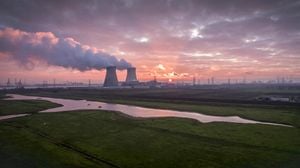California's Governor Gavin Newsom is setting the stage for significant changes to the state's electric vehicle (EV) incentives, all amid pressing tensions with both former President Donald Trump and Tesla CEO Elon Musk. Newsom’s proposed $7,500 state tax incentive for EV buyers would kick off if Trump’s administration decides to eliminate federal tax credits aimed at boosting the EV market.
But here's the kicker: Newsom's plan distinctly leaves out Tesla from this potential state benefit. This exclusion marks yet another chapter of the fraught relationship between California’s governor and Musk, who has continually diverged from the state’s policies, especially after relocating Tesla’s headquarters to Texas.
Newsom's administration aims to promote broader competition within the auto industry. His office asserts, "We want more carmakers to take root here," aiming to create opportunities for manufacturers other than Tesla, which has long dominated California's EV market. Currently, Tesla holds approximately 54.5% of the state's registered EVs—a number that's gradually declined from 63% the previous year. With more competitors entering the market, this shift could help to spread out sales more equitably.
The proposed state tax credit is not yet fully fleshed out. State officials haven’t clarified how this initiative will function financially, or if it would incorporate the existing $4,000 federal tax credit for used electric vehicles. Meanwhile, EV sales are surging, making up 22% of California's vehicle registrations as of September 2024. The state has also recently surpassed the milestone of 2 million zero-emission vehicle sales since 2022.
Newsom’s ambitious plans for California go beyond mere subsidies. By 2035, the governor aims for 80% of all new vehicles sold to be fully electric, with the remainder being plug-in hybrids. To align with these goals, state officials are awaiting approval from the Environmental Protection Agency (EPA) to ban sales of gasoline-only vehicles by the same year.
This future vision, though, isn’t just sunshine and rainbows. Challenges loom as Trump’s transition team quietly prepares to roll back many of the Biden administration's climate policies, including EV mandates. Over the past few years, Trump has consistently targeted California’s authority to uphold stricter emissions standards, and his administration is poised to challenge California's regulatory might again.
Within this politically charged atmosphere, Trump’s return to office could bring about new hurdles for the state’s expansive EV strategy, and the clash seems inevitable. Newsom is already preparing for the showdown. He has called for emergency sessions of the legislature, gunning to bolster defenses against federal encroachments.
Musk, for his part, has openly criticized the exclusion from the proposed state incentives, calling it "insane," especially considering Tesla remains the only company manufacturing EVs within California. This coming skirmish over EV policy reflects broader Republican vs. Democratic tensions and distills the culture war raging across the country, particularly around climate and energy policies.
The stakes are high, not just for the auto manufacturers, but for consumers, particularly as Newsom nears the finalization of his tax incentive plan. Stakeholders, including lawmakers and consumers, are closely watching developments as California continues to serve as the epicenter of the electric vehicle movement.
Political analysts are pondering the long-term ramifications of these two powerful men—the White House and California's leadership—engaging at loggerheads over such pressing matters. Dan Schnur, political analyst and educator, noted the dynamic nature of Newsom’s and Musk’s relationship. Evaluations of competition and market accessibility are at the forefront, information echoed by other industry voices.
A notable concern from industry players like automotive analyst Jessica Caldwell reflects Tesla's unique challenges: if the state intends to boost competition and expand the EV market, excluding Tesla appears contradictory. “Why should they be left out of these incentives?” Caldwell pondered, pointing to its substantial brand visibility and consumer recognition.
Some lawmakers and analysts, including Democratic Congressman Ro Khanna from Silicon Valley, echo Caldwell's sentiments. He argues it would be “foolish” to push Tesla aside from potential benefits, considering the company’s significant contributions to the state’s economy and EV infrastructure.
California's aggressive pursuit of EV adoption is also entangled with wider market trends. Transitioning away from fossil fuels to cleaner energy continues to gain momentum, though it will necessitate carefully orchestrated strategic planning—not just policy-based punishments or exclusions directed at any one company.
Given these circumstances, the coming months could significantly shape the conversations around climate policy and automotive innovation, both at the state and national levels. With demonstrations of regulatory and political will at play, Newsom and Musk’s continued interactions will likely be pivotal and reflective of broader societal debates and economic strategies moving forward.



